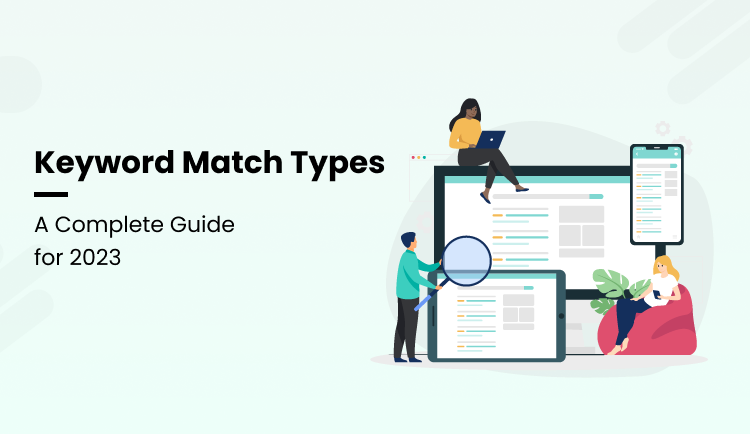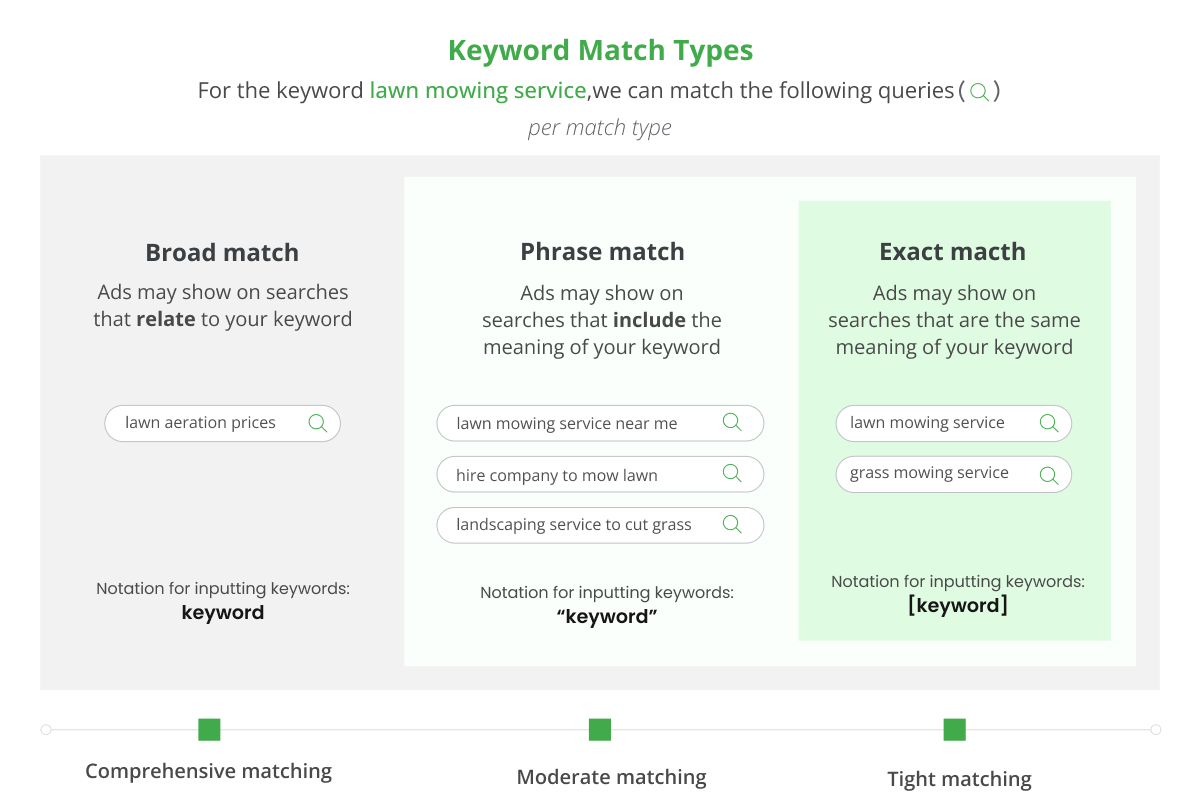
Keyword Match Types – A Complete Guide for 2023
When it comes to reaching the right audience, keywords play an imperative role. The types of keywords you use in your content should be meaningful and relatable to your audience.
So, what are keywords, and why are they so important?
Keywords are words or phrases that are used by search engines to match a searcher’s query to the most relatable site online. You place keywords in your content, such as blogs, articles, videos, etc. Aside from that, keywords are used on Google Ads as well.
Words or phrases used on Google Ads are frequently known as keyword match types. They are used to match advertisements with search queries. The keyword match type specifies the degree of similarity between the keyword and the user’s search query for the ad.
Google Ads Keyword Match Types
Keyword match types are broadly categorized into the following three categories:

- Broad Match Keywords
- Phrase Match Keywords
- Exact Match Keywords
Broad keyword match types are used when you want to serve your ad on a broader range of user inquiries. While exact match, as the name says, is to zero in on specific user queries.
When developing search engine marketing campaigns, you will need to select one of the three types of matches described above.
In this post, we will discuss in detail the different keyword match types.
Let’s get started…
Broad Match Keywords
Broad match is the match type that is assigned to all of your keywords by default. This match type allows your adverts to reach a larger audience without having you to create a lengthy keyword list.
With broad match keywords, you don’t need to include any kind of modifier (such as quotes or brackets around the term). Using broad match keywords, you can narrow your search to phrases that are related to your desired term in some way. Doing so broadens the scope of your ads and helps you reach a larger audience.
Marketers who have sizable advertising budgets and have a larger audience to target opt for the broad keyword match types. You need to conduct extensive testing when using this match type, in addition to having a robust strategy for using negative keywords.
Example of a Broad Match Keyword
Take the broad match keyword “car windshield replacement” as an example. Even if it doesn’t contain any of the terms as your keyword, this phrase can still be accessed through searches for things like “automobile glass replacement,” “car glass replacement,” and so on.
Phrase Match Keywords
Phrase Match Keyword is yet another type of keyword or phrase used to make your ads appear in response to inquiries that contain synonyms or close misspellings of your target term.
When you target them, phrase match keywords are surrounded by quotation marks. In addition, your keyword can have additional words added before or after it, but not in the middle. Your keyword will be matched against any search terms that include the same meaning as the phrase you’ve provided.
Your advertisements will only be matched to relevant search words that are very closely associated with the keyword you provide.
Phrase Match Keywords are considered the best types of keywords as they provide a large amount of search volume without sacrificing relevancy.
Example of Phrase Match Keyword
Take the phrase match keyword ‘running shoes’ as an example. When you use this as a phrase keyword match type in your Google ad, your ad may also appear for phrase match when searching for sports shoes, comfortable shoes for running, buy running shoes online, and so on.
Exact Match Keywords
Exact match keywords, as the name says, are the words or phrases that display your advertising for queries with the same meaning or intent as your term.
These keyword match types are always placed using brackets around the full term. They are used to match specific search queries and searches that have the same meaning.
Exact match keywords help marketers tremendously. They are used to reach out to your target audience. They provide you with the highest level of relevancy and the most precise targeting for both your advertisements and your landing pages.
Example of an Exact Match Keyword
Take the keyword [running shoe women] as an exact match keyword. Your ad will appear to women looking for running shoes. Using this keyword, you simply exclude searches for “running shoes.” Exact match types are meant to target a specific group that is likely to be people looking for products that you sell for women.
Negative Keywords
Negative keywords are the terms or phrases that you use to exclude unimportant search phrases. These words prevent your ad from appearing when a particular phrase or word is searched for.
You can prevent anyone searching for a particular topic from seeing your advertisements by using “negative” keywords.
For instance, if you have a shoe company but you don’t want to target the audience looking for discounts or deals. In such a situation, you may include a “negative keyword” for the term “buy running shoes on sale,” “running shoes on discount,” or “cheap running shoes” in your listing.
How to Make Use of Different Types of Keyword Matches?
It is crucial to use each keyword match type strategically. You cannot simply use any keyword anywhere in your Google Ad. Doing so will lead to havoc and total loss of money that you will put into your ad.
The three different types of keywords outlined above are meant to be used appropriately in your ads. Different keywords are used in different scenarios. Each has its own purpose to serve when it comes to strategic marketing campaigns.
Using Broad Match Modifier
If you wish to reach out to a larger audience, a broad match may be the optimal choice. These words help you generate huge traffic with your advertisements. However, with broad match terms, there is always a likelihood of attracting a large number of irrelevant searches.
This match type is an ideal option for marketers with a larger budget or who are already established in the market.
PROBLEM: If you have a limited marketing budget or you’re just starting out with your campaigns, then it’s a BIG NO! It is because the broad match is meant to maximize your reach. Undoubtedly, you will receive more visits, but you can’t be sure of having the relevant searches.
SOLUTIONS: Using a list of restrictive negative keywords to broad match type can help you with your endeavor.
Aside from that, broad match types combined with smart bidding can help you take full benefits of this match type.
Using Phrase Match Type
Phrase match keywords are designed to prevent irrelevant searches from triggering your advertisements. Using these terms will prevent your ads from appearing in response to irrelevant search queries.
Know that the frequency with which your adverts appear for relevant search phrases will directly impact your conversion rate.
PROBLEM: Some irrelevant search queries may still trigger your advertisements, impacting your PPC and conversion rate.
SOLUTION: Using restrictive negative keywords to phrase match type can help you significantly.
Using Exact Match Type
Exact match keywords are meant to target a specific group of people. It assures accurate targeting and, thus, a high conversion rate.
PROBLEM: Though they are meant to be used for specific keywords to target people who’re looking for the products you sell, you may end up having a very low conversion rate.
SOLUTION: These types of keywords perform best when used for demonstrated impression-generating keywords.
Why Are Google Ads Match Keywords So Crucial?
Using the right Google Ads match type is crucial. You must develop your campaign strategically. Of course, you cannot leave PPC match types to coincidence. Also, guesswork doesn’t work really well when it comes to Google Ads’ success rate.
The right types of keywords can help you significantly. Keyword match types enable you to appear only for queries that are relevant to your keywords or the products you are advertising.
When you design an ad campaign, make sure to opt for the relevant match type. Before you study your competition, you need to understand your own requirements first.
Yes, you need to have a thorough understanding of the outcome that you wish to achieve using Google Ads. Using the correct keyword match type will allow you to get optimal results and reach your target audience.
The rule of thumb to have a successful Google Ad Campaign is to observe a trend in your ads account and see which all keywords perform better than others. Then, prioritize these keywords in their ad groups and increase your budget to reach more people who are using these proven, conversion-oriented search terms to search for things that you sell.
Using a variety of match types for your campaigns guarantees that your ads will appear for pertinent searches. You can even experiment with various match types in your ad groups. However, this necessitates preparatory work.
For that, you should first develop a framework that supports combined match types. Accordingly, you can design a strategy that works best for you.
Pro Tip: Be mindful of combined match types. Sometimes displaying multiple ads in various ad groups or campaigns may result in inefficiency due to cross-ad group competition.
To Conclude…
So, here we conclude our guide to keyword match types. Hopefully, this article has been informative for you and helped you to understand how a particular match type keyword performs.
We hope that by using this guide, you may be able to utilize the right type of keywords for your Google Ad Campaign.
Know that using the appropriate keyword match type will bring in the appropriate type of traffic, thereby leading to high conversion rates and increased ROI.
Choose your match types wisely!



